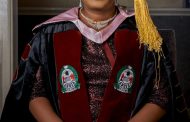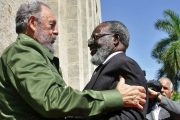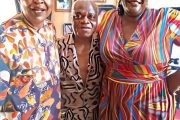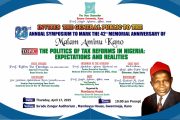The Centre for Democracy and Development, (CDD), a major guardian of democratization in Nigeria, says the very foundation of the country’s 20 year old democratic order came under grievous assault in the election in two states of Kogi and Bayelsa states at the weekend and that the results could not stand.

It warned against what the elections have generally been seen to have turned out to be
While calling for calm rather than despair on the part of all electoral stakeholders in Kogi and Bayelsa states, the think tank is insisting Nigerians must collectively work to reclaim the electoral system from the grip of those it calls partisan outlaws, asserting that Nigerians should not forget the key moments in her national life when the lack of transparency in the electoral process led to serious outbreak of violence and truncation of democracy in 1964, 1983, and after the annulment of the June 12 1993 elections. It told a press briefing in a combative post-election assessment titled “Gunpoint Democracy in Kogi/Bayelsa State: A Call To Action” that President Buhari must demonstrate leadership to redeem sanctity of the ballot. Prof Adele Jinadu and Ms Idayat Hassan signed the text of the Press Briefing Monday, November 18th, 2019 in Abuja.
“The magnitude of the violent assault on the sanctity of the ballot was shocking. The outcome of a process that was so criminally subverted should not be allowed to stand”, argues the think-tank which had anticipated violence in the elections and called for extra contingency plans by the Independent National Electoral Commission, (INEC) and the Police ahead of the polls.
Although INEC and the Police chief alerted Nigerians to what they both referred to as the practice of importing thugs from neighboring states, none of the two bodies have spoken yet on the outcome of the elections. The act of declaring winners would, however, suggest that the two bodies have no reservations against the action.
There is nothing to suggest that the last has been heard on this and the legacy of messy elections in Africa’s most populous country!
Concluding from a long list of empirical evidence that its observers and trained journalists compiled and which it says makes the election a complete sham, including no less than 10 deaths, the centre is ruling out silence on its part “in the face of the brazen violations of electoral process that we witnessed on November 16 cannot be an option”. And that as a think tank with the mission to provide strategic analysis for the consolidation of democracy
and sustainable development, it is bound to make the urgent call to action in favour of a robust multi-stakeholder response that could rescue Nigeria’s electoral process.
History, says CDD, would reserve very harsh judgment for it as a generation of Nigerians if standing by and doing nothing became an option when citizens are being increasingly stripped of the fundamental right to decide those who govern them. It has rejected parallels being drawn between the weekend elections and similar elections in 2003/2007 elections, pointing out how unaffordable it is to return to the lowest point in the country’s electoral experience.
CDD is specifically calling on President Muhammadu Buhari to, in its own words, urgently provide the leadership needed to rescue the electoral process, and by extension the entire democratic system, from irreversible decline, saying that Buhari was able to ascend the Presidency through the historic 2015 elections because the electoral process allowed the votes to be counted fairly.
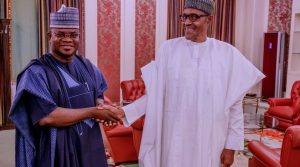
President and Kogi governor in a previous photograph

President and Gov-elect, David Lyon of Bayelsa State
It is not clear if the CDD is aware that the president has already congratulated the winner of the election in the case of Kogi State, an action that would seem to make nonsense of the strategy of pushing the burden of rectifying the mess CDD has observed to the president. CDD is, however, insisting that the elections in question are a serious indictment on the country’s national capacity in that, two decades after the advent of the current democratic dispensation, there are guarantees against threats to the right of citizens to make their democratic preferences in an atmosphere devoid of fear and insecurity.
According to CDD, the recurring violations of the electoral process amounts to an assault on the constitution of Nigeria because the right of citizens to have a say in determining who governs them is constitutionally enshrined in Section 14(2a) which states that sovereignty belongs to the people from whom governments derive all powers and authority just as Section 14 (2c) directs that the “participation by the people in their government shall be ensured”,
The level of violence and coordinated disruption of the electoral process as seen in Kogi and
Bayelsa states point to the need for a fundamental re-organisation of election security, concludes the statement which goes on to state how large deployments did not translate to a better, secured electoral space in the two states. In fact, by CDD’s reckoning, the problem transcended lack of effective response from the security agencies to their “direct complicity … in giving the leeway to hoodlums to disrupt the elections”. This was such that, contrary to the norm of restricting vehicular movement on Election Day, hoodlums moving freely and carrying out their nefarious acts against voters was a common feature.
CDD came to a conclusion which has to be quoted extensively: Once again, the ordinary citizen was let down by the failure of security services to rise to the occasion. Many eligible voters who were disenfranchised as a result of the volatile character of the polling environment should rightly question what the deployment of thousands of officers achieves, when they cannot protect voters, and the polling areas from violent attacks by armed thugs. The big numbers the police claimed to have deployed was neither visible to the eye, nor impactful in terms of guaranteeing the safety of the electorate. The complicity of the state in dismantling, rather than strengthening the electoral process, is a problem for Nigeria’s democracy”.
Beyond pushing the burden of rectifying electoral rascality to President Buhari, CDD is posing the following options as the ways out of the stalemate in credible elections in Nigeria:
- The immediate creation of an Electoral Offences Commission which would have the sole
mandate of holding to account all those who commit infractions against the process, thereby restarting the campaign for electoral integrity by returning the country to the key recommendations of the Justice Uwais Panel; - Internationalising the campaign for electoral accountability by invoking the principle of
responsibility to protect as enshrined in the African Union Instrument on Democracy
Elections and Good Governance, and in the International Criminal Court Statues, meaning the inadequacy of visa bans and travel restrictions as deterrence for the kind of
violations that have taken place in Nigerian elections. - A Public Panel of Inquiry by President Muhammadu Buhari to, immediately, unravel the immediate and remote causes of the failure of security in the build up and
after the elections; - Civil Society Organisation and citizens at the grassroots should revive and step up
mandate protection campaigns to enlighten citizens on how to protect their votes in the
face of sustained hostility from the political actors.




